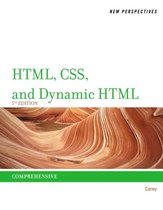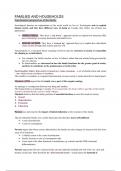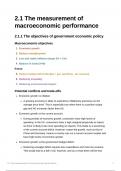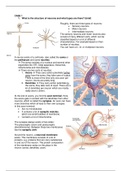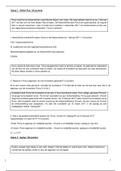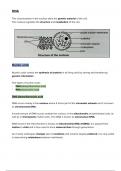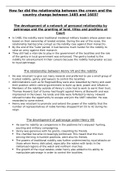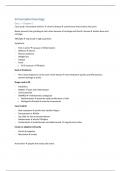Chapter 1
Getting Started with HTML5
Exploring the history of the World Wide Web
1. Networks
- A network is a structure that allows devices (nodes or hosts) to be linked together to
share information and services
- Hosts: Can include devices such as computers, printers and scanners because they are
all capable of sending and receiving data electronically over a network
A host that provides information or a service is called a server
A print server is a network that provides printing services to the network
A file server is a host that provides storage space for saving and retrieving files
- Client: A computer or other device that receives a server
- Client-Server network: Commonly used design where several clients access information
provided by 1+ servers
- Networks can be classified on the range they cover
Local Area Network (LAN): A network confined to a small geographic area
(within a building or department)
Wide Area Network (WAN): Network that covers a wider area (several buildings
or cities) and typically consists of 2+ interconnected LANs
The largest WAN in existence is the Internet which incorporates an uncountable
number of networks and hosts
2. Locating information on a Network
- Timothy Berners-Lee and other researchers at the CERN nuclear research facility near
Geneva, Switzerland, laid the foundations for the World Wide Web in 1989
- They developed a system of interconnected hypertext documents that allowed their
users to easily navigate from one topic to another
- Hypertext: A method of organization in which data sources are interconnected through
a series of links or hyperlinks that users can activate to jump from one piece of
information to another
3. Web pages and Web servers
- Each document of the WWW is referred to as a web page
- Web pages are stored on web servers, which are computers that make web pages
available to any device connected to the internet
- A web browser retrieves the page from the web server and renders it on the user’s
computer or other device
- The earliest browsers (text-based browsers) were incapable of displaying images
Introducing HTML5
- A web page is a text file written in Hypertext Markup Language
- Markup language: A language that describes the content and structure of a document
by identifying, or tagging, different elements in the document
First popular markup language was Standard Generalised Markup Language
(SGML)
- In early years of HTML, web developers were free to define and modify HTML in
whatever ways they thought best
- A group of web designers and programmers (World Wide Web Consortium / W3C)
created a set of standards or specifications that all browser manufacturers were to
follow
Has no enforcement power
The recommendations of them are usually followed since a uniform approach to
web page creation is beneficial to everyone
Getting Started with HTML5
Exploring the history of the World Wide Web
1. Networks
- A network is a structure that allows devices (nodes or hosts) to be linked together to
share information and services
- Hosts: Can include devices such as computers, printers and scanners because they are
all capable of sending and receiving data electronically over a network
A host that provides information or a service is called a server
A print server is a network that provides printing services to the network
A file server is a host that provides storage space for saving and retrieving files
- Client: A computer or other device that receives a server
- Client-Server network: Commonly used design where several clients access information
provided by 1+ servers
- Networks can be classified on the range they cover
Local Area Network (LAN): A network confined to a small geographic area
(within a building or department)
Wide Area Network (WAN): Network that covers a wider area (several buildings
or cities) and typically consists of 2+ interconnected LANs
The largest WAN in existence is the Internet which incorporates an uncountable
number of networks and hosts
2. Locating information on a Network
- Timothy Berners-Lee and other researchers at the CERN nuclear research facility near
Geneva, Switzerland, laid the foundations for the World Wide Web in 1989
- They developed a system of interconnected hypertext documents that allowed their
users to easily navigate from one topic to another
- Hypertext: A method of organization in which data sources are interconnected through
a series of links or hyperlinks that users can activate to jump from one piece of
information to another
3. Web pages and Web servers
- Each document of the WWW is referred to as a web page
- Web pages are stored on web servers, which are computers that make web pages
available to any device connected to the internet
- A web browser retrieves the page from the web server and renders it on the user’s
computer or other device
- The earliest browsers (text-based browsers) were incapable of displaying images
Introducing HTML5
- A web page is a text file written in Hypertext Markup Language
- Markup language: A language that describes the content and structure of a document
by identifying, or tagging, different elements in the document
First popular markup language was Standard Generalised Markup Language
(SGML)
- In early years of HTML, web developers were free to define and modify HTML in
whatever ways they thought best
- A group of web designers and programmers (World Wide Web Consortium / W3C)
created a set of standards or specifications that all browser manufacturers were to
follow
Has no enforcement power
The recommendations of them are usually followed since a uniform approach to
web page creation is beneficial to everyone

